Wagner Mercenary Leader Issues Defiant Audio Statement as Uncertainty Swirls After Mutiny
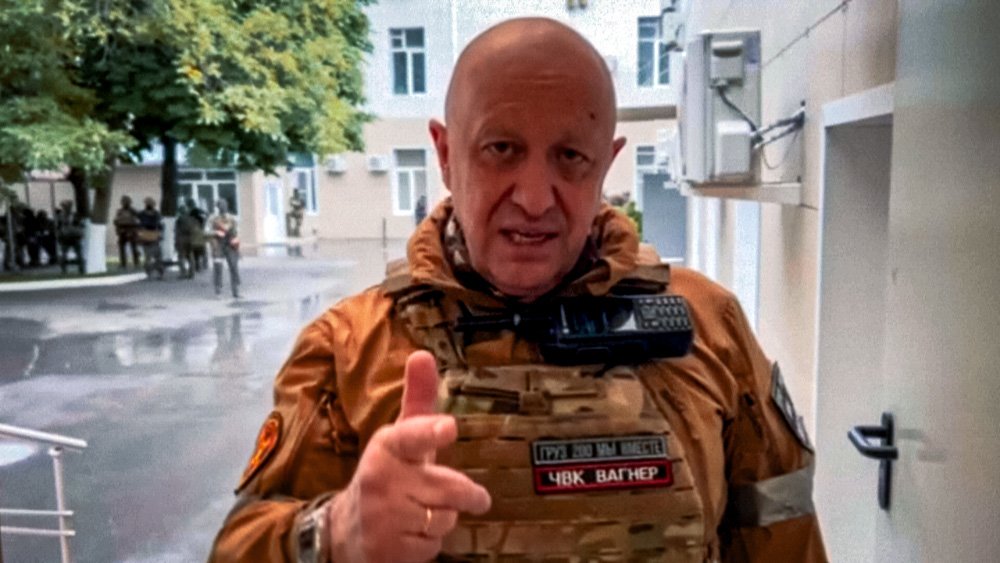
In this handout photo taken from video released by Prigozhin Press Service, Yevgeny Prigozhin, the owner of the Wagner Group military company, records his video addresses in Rostov-on-Don, Russia, Saturday, June 24, 2023. Prigozhin Press Service photo via AP.
The leader of the Wagner mercenary group defended his short-lived insurrection in a boastful audio statement Monday, but uncertainty still swirled about his fate, as well as that of senior Russian military leaders, the impact on the war in Ukraine, and even the political future of President Vladimir Putin.
Russian Defense Minister Sergei Shoigu made his first public appearance since the uprising that demanded his ouster, in a video aimed at projecting a sense of order after the country’s most serious political crisis in decades.
In an 11-minute audio statement, Yevgeny Prigozhin said he acted “to prevent the destruction of the Wagner private military company” and in response to an attack on a Wagner camp that killed some 30 fighters.
“We started our march because of an injustice,” Prigozhin said in a recording that gave no details about where he is or what his future plans are.
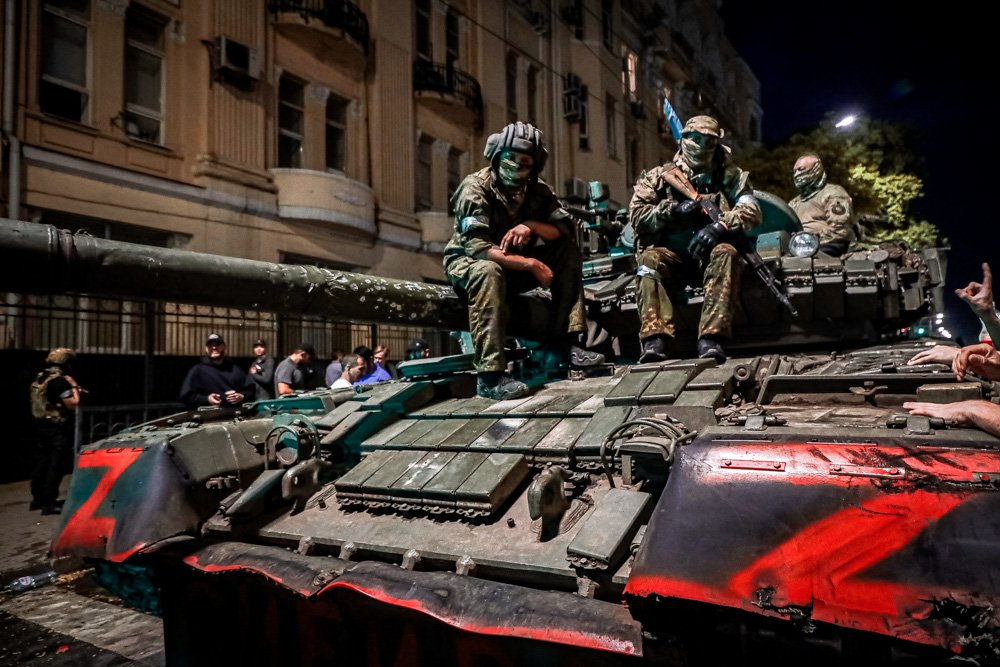
Members of the Wagner Group military company sit atop of a tank on a street in Rostov-on-Don, Russia, Saturday, June 24, 2023, prior to leaving an area at the headquarters of the Southern Military District. Kremlin spokesman Dmitry Peskov said that Yevgeny Prigozhin's troops who joined him in the uprising will not face prosecution, and those who did not will be offered contracts by the Defense Ministry. After the deal was reached Saturday, Prigozhin ordered his troops to halt their march on Moscow and retreat to field camps in Ukraine, where they have been fighting alongside Russian troops. AP photo.
A feud between the Wagner Group leader and Russia's military brass that has festered throughout the war erupted into a mutiny that saw the mercenaries leave Ukraine to seize a military headquarters in a southern Russian city and roll seemingly unopposed for hundreds of miles toward Moscow, before turning around after less than 24 hours on Saturday.
The Kremlin said it had made a deal for Prigozhin to move to Belarus and receive amnesty, along with his soldiers. There was no confirmation of his whereabouts Monday, although a popular Russian news channel on Telegram reported he was at a hotel in the Belarusian capital, Minsk.
In his statement, Prigozhin taunted Russia's military, calling his march a “master class” on how it should have carried out the February 2022 invasion of Ukraine. He also mocked the Russian military for failing to protect the country, pointing out security breaches that allowed Wagner to march 780 kilometers (500 miles) without facing resistance and block all military units on its way.
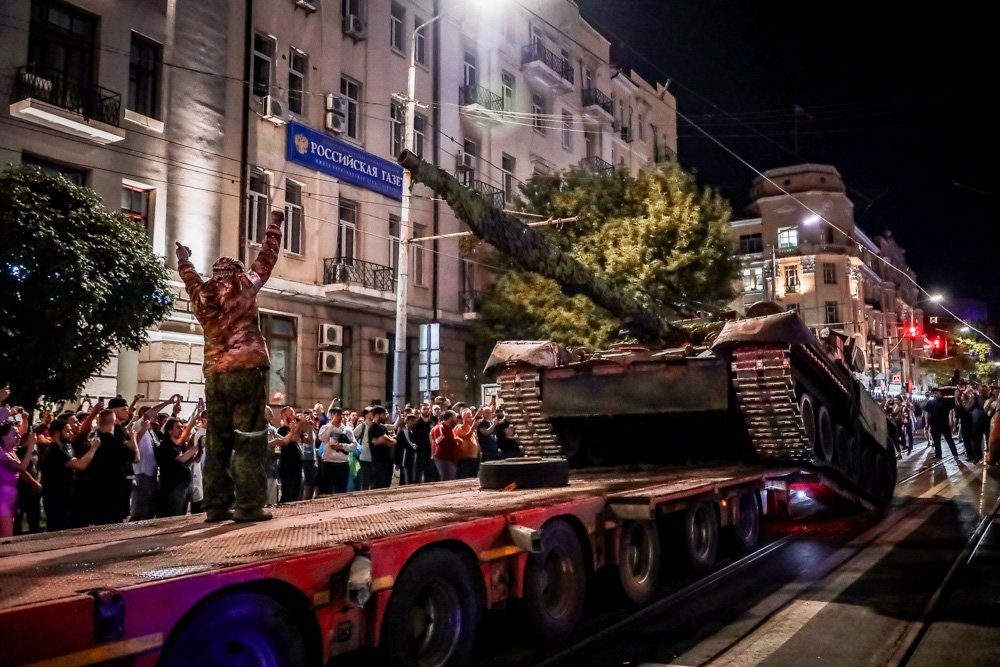
Members of the Wagner Group military company load their tank onto a truck on a street in Rostov-on-Don, Russia, Saturday, June 24, 2023, prior to leaving an area at the headquarters of the Southern Military District. Kremlin spokesman Dmitry Peskov said that Yevgeny Prigozhin's troops who joined him in the uprising will not face prosecution and those who did not will be offered contracts by the Defense Ministry. After the deal was reached Saturday, Prigozhin ordered his troops to halt their march on Moscow and retreat to field camps in Ukraine, where they have been fighting alongside Russian troops. AP photo.
The bullish statement made no clearer what would ultimately happen to Prigozhin and his forces under the deal purportedly brokered by Belarusian President Alexander Lukashenko.
Prigozhin didn’t disclose details, but said Lukashenko “proposed finding solutions for the Wagner private military company to continue its work in a lawful jurisdiction.” That suggested Prigozhin might keep his military force, although it wasn’t immediately clear which jurisdiction he was referring to.
The independent Russian news outlet Vyorstka claimed that construction of a field camp for up to 8,000 Wagner troops was underway in an area of Belarus about 200 kilometers (320 miles) north of the border with Ukraine.
The report couldn’t be independently verified. The Belarusian military monitoring group Belaruski Hajun said Monday on Telegram that it had seen no activity in that district consistent with construction of a facility, and hadn’t no indications of Wagner convoys either in or moving towards Belarus.
Though the mutiny was brief, it was not bloodless. Russian media reported that several military helicopters and a communications plane were shot down by Wagner forces, killing at least 15. Prigozhin expressed regret for downing the aircraft but said they were bombing his convoys.
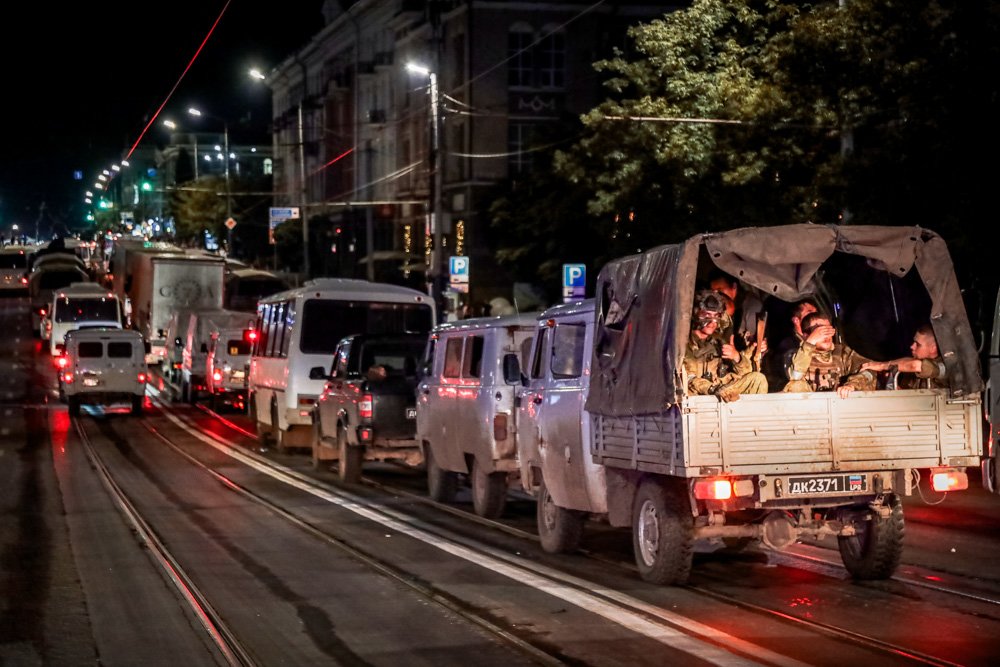
Servicemen of the Wagner Group military company sit in their military vehicles as they prepare to leave an area at the HQ of the Southern Military District in a street in Rostov-on-Don, Russia, Saturday, June 24, 2023. Yevgeny Prigozhin's troops who joined him in the uprising will not face prosecution and those who did not will be offered contracts by the Defense Ministry. After the deal was reached Saturday, Prigozhin ordered his troops to halt their march on Moscow and retreat to field camps in Ukraine, where they have been fighting alongside Russian troops. AP photo.
Russia's Defense Ministry has denied attacking Wagner's camp, and the U.S. had intelligence that Prigozhin was building up his forces near the border with Russia for some time, suggesting the revolt was planned.
Russian media reported that a criminal case against Prigozhin hasn’t been closed, despite earlier Kremlin statements, and some Russian lawmakers called for his head.
Andrei Gurulev, a retired general and current lawmaker who has rowed with the mercenary leader, said Prigozhin and his right-hand man Dmitry Utkin deserve “a bullet in the head.”
It was unclear what resources Prigozhin can draw on, and how much of his substantial wealth he can access. Police searching his St. Petersburg office amid the rebellion found 4 billion rubles ($48 million) in trucks outside the building, according to Russian media reports confirmed by the Wagner boss. He claimed the money was intended to pay his soldiers’ families.
Russian media reported that Wagner offices in several Russian cities had reopened on Monday and the company had resumed enlisting recruits.
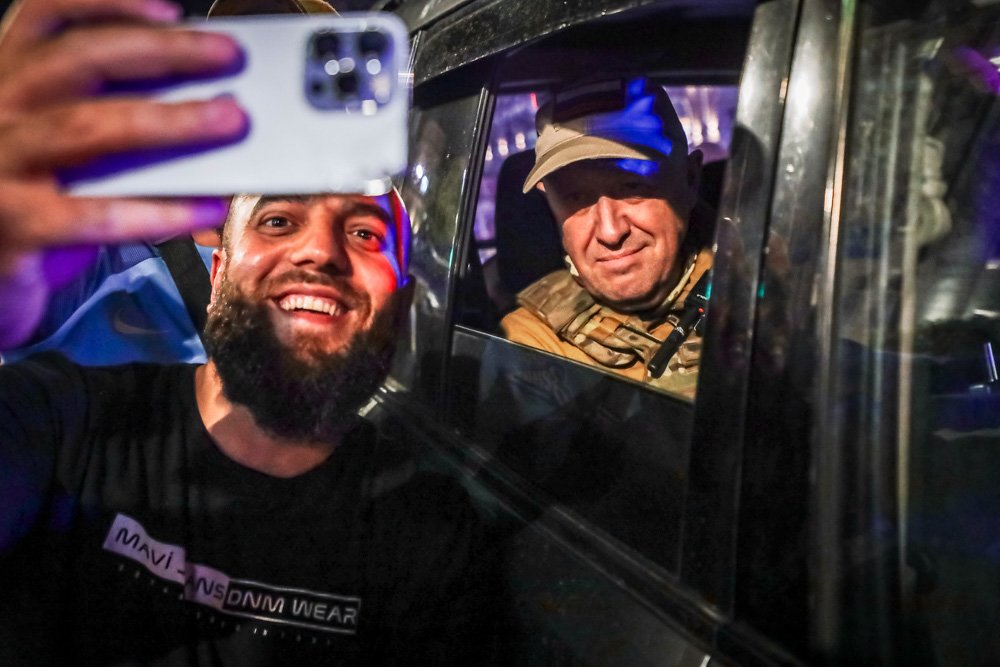
Yevgeny Prigozhin, the owner of the Wagner Group military company, right, sits inside a military vehicle posing for a selfie photo with a local civilian on a street in Rostov-on-Don, Russia, Saturday, June 24, 2023, prior to leaving an area of the headquarters of the Southern Military District. Kremlin spokesman Dmitry Peskov said that Prigozhin's troops who joined him in the uprising will not face prosecution and those who did not will be offered contracts by the Defense Ministry. After the deal was reached Saturday, Prigozhin ordered his troops to halt their march on Moscow and retreat to field camps in Ukraine, where they have been fighting alongside Russian troops. AP photo.
In a return to at least superficial normality, Moscow’s mayor announced an end to the “counterterrorism regime” imposed on the capital Saturday, when troops and armored vehicles set up checkpoints on the outskirts and authorities tore up roads leading into the city.
The Defense Ministry published video of Shoigu in a helicopter and then meeting with officers at a military headquarters in Ukraine. It was unclear when it was shot. The video came as Russian media speculated that Shoigu and other military leaders have lost Putin’s confidence and could be replaced.
Before the uprising, Prigozhin had blasted Shoigu and General Staff chief Gen. Valery Gerasimov with expletive-ridden insults for months, attacking them for failing to provide his troops with enough ammunition during the fight for the Ukrainian town of Bakhmut, the war’s longest and bloodiest battle.
Prigozhin’s statement appeared to confirm analysts' view that the revolt was a desperate move to save Wagner from being dismantled after an order that all private military companies sign contracts with the Defense Ministry by July 1.
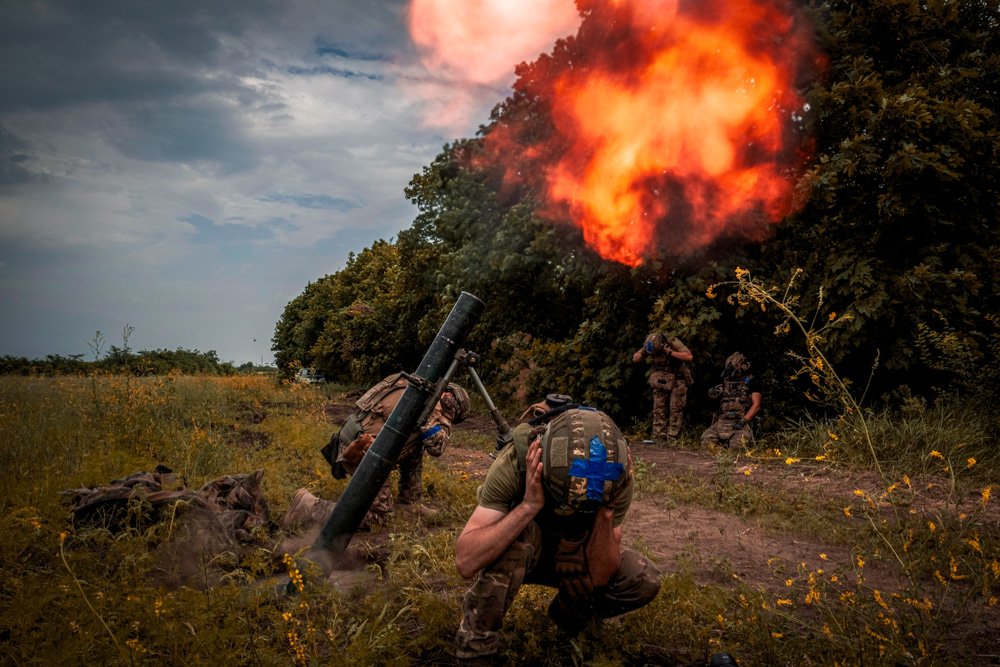
Ukrainian soldiers fire towards Russian positions on the frontline in Zaporizhzhia region, Ukraine, Saturday, June 24, 2023. AP photo by Efrem Lukatsky.
Prigozhin said the majority of his fighters refused to come under the Defense Ministry’s command, and the force planned to hand over the military equipment it was using in Ukraine on June 30, after pulling out of Ukraine and gathering in the southern Russian city of Rostov-on-Don. Prigozhin claimed an attack that killed his fighters outraged the commanders and they decided to move sooner.
Russian political analyst Tatiana Stanovaya said on Twitter that Prigozhin’s mutiny “wasn’t a bid for power or an attempt to overtake the Kremlin,” but a desperate move amid his escalating rift with Russia’s military leadership.
While Prigozhin could get out of the crisis alive, he doesn’t have a political future in Russia under Putin, Stanovaya said.
It was unclear what the fissures opened by the 24-hour rebellion would mean for the war in Ukraine, where Western officials say Russia’s troops suffer low morale. Wagner's forces were key to Russia's only land victory in months, in Bakhmut.
The U.K. Ministry of Defense said Monday that Ukraine had “gained impetus” in its push around Bakhmut, making progress north and south of the town. Ukrainian forces claimed to have retaken Rivnopil, a village in an area of southeast Ukraine that has seen heavy fighting.
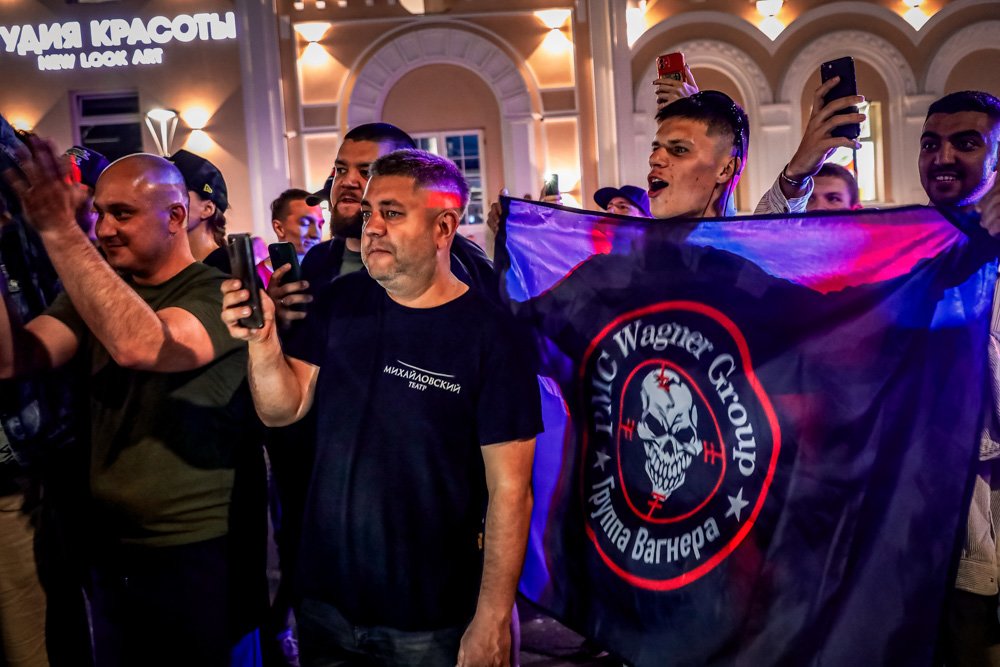
People shout and wave a flag of the Wagner Group military company to servicemen prior to their leaving an area at the headquarters of the Southern Military District in Rostov-on-Don, Russia, Saturday, June 24, 2023. Kremlin spokesman Dmitry Peskov said that Yevgeny Prigozhin's troops who joined him in the uprising will not face prosecution and those who did not will be offered contracts by the Defense Ministry. After the deal was reached Saturday, Prigozhin ordered his troops to halt their march on Moscow and retreat to field camps in Ukraine, where they have been fighting alongside Russian troops. AP photo.
U.S. President Joe Biden and leaders of several of Ukraine's European allies discussed events in Russia over the weekend, but Western officials have been muted in their public comments.
Russian Foreign Minister Sergey Lavrov told broadcaster RT that U.S. Ambassador Lynne Tracy contacted Russian representatives Saturday to stress that the U.S. was not involved in the mutiny and considered it an internal Russian matter. There was no immediate confirmation from the U.S., although Secretary of State Antony Blinken said Sunday that U.S. officials had “engaged” with Russia to stress the importance of protecting U.S. citizens and interests.
NATO Secretary-General Jens Stoltenberg said Monday that “the events over the weekend are an internal Russian matter.”
EU foreign policy chief Josep Borrell said the revolt showed that the war is “cracking Russia's political system.”
“The monster that Putin created with Wagner, the monster is biting him now," Borrell said. “The monster is acting against his crea tor.”
Associated Press writers Lorne Cook in Brussels and Jill Lawless in London contributed.
Read Next: Russian Mercenaries in Ukraine Stoked Fear of Invasion

The Associated Press is an independent global news organization dedicated to factual reporting, founded in 1846.
BRCC and Bad Moon Print Press team up for an exclusive, limited-edition T-shirt design!
BRCC partners with Team Room Design for an exclusive T-shirt release!
Thirty Seconds Out has partnered with BRCC for an exclusive shirt design invoking the God of Winter.
Lucas O'Hara of Grizzly Forge has teamed up with BRCC for a badass, exclusive Shirt Club T-shirt design featuring his most popular knife and tiomahawk.
Coffee or Die sits down with one of the graphic designers behind Black Rifle Coffee's signature look and vibe.
Biden will award the Medal of Honor to a Vietnam War Army helicopter pilot who risked his life to save a reconnaissance team from almost certain death.
Ever wonder how much Jack Mandaville would f*ck sh*t up if he went back in time? The American Revolution didn't even see him coming.
A nearly 200-year-old West Point time capsule that at first appeared to yield little more than dust contains hidden treasure, the US Military Academy said.












